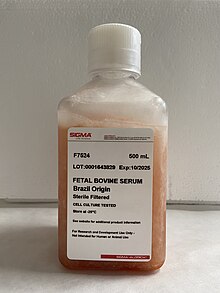This article may need to be rewritten to comply with Wikipedia's quality standards. (November 2021) |

Fetal bovine serum (FBS) is derived from the blood drawn from a bovine fetus via a closed system of collection at the slaughterhouse. Fetal bovine serum is the most widely used serum-supplement for the in vitro cell culture of eukaryotic cells. This is due to it having a very low level of antibodies and containing more growth factors, allowing for versatility in many different cell culture applications.
The globular protein, bovine serum albumin (BSA), is a major component of fetal bovine serum. The rich variety of proteins in fetal bovine serum maintains cultured cells in a medium in which they can survive, grow, and divide.
Because it is a biological product, FBS is not a fully defined media component, and as such varies in composition between batches.[1] As a result of this and in an attempt to minimize the possibility of transfer of adventitious agents, serum-free and chemically defined media (CDM) have been developed. However, the effectiveness of serum-free media is limited as many cell lines still require serum in order to grow, and many serum-free media formulations can only support the growth of narrowly-defined types of cells.[2]
- ^ Dirks WG (2021). "Ethical Challenges Using Human Tumor Cell Lines in Cancer Research". Ethical Challenges in Cancer Diagnosis and Therapy. Recent Results in Cancer Research. Vol. 218. pp. 39–46. doi:10.1007/978-3-030-63749-1_4. ISBN 978-3-030-63748-4. PMID 34019161. S2CID 235072805.
- ^ Yao T, Asayama Y (April 2017). "Animal-cell culture media: History, characteristics, and current issues". Reproductive Medicine and Biology. 16 (2): 99–117. doi:10.1002/rmb2.12024. PMC 5661806. PMID 29259457.